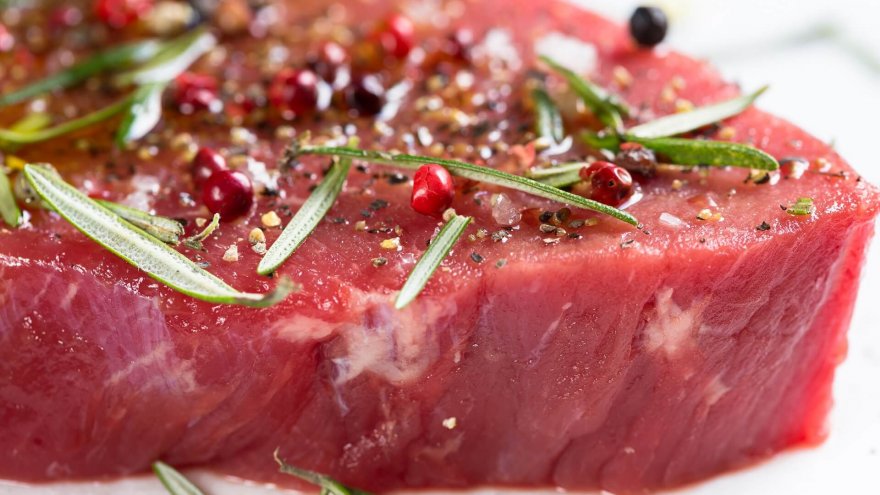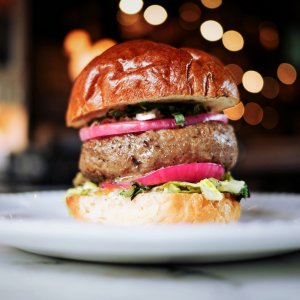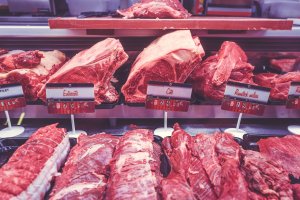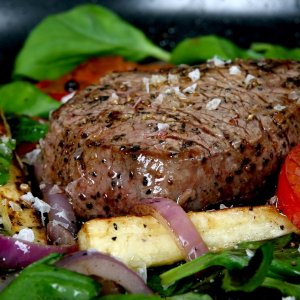Eating Meat and Running – How Much Should You Consume?

Blink, and the diet industry has changed its mind. No matter where you look, society and our culture bombards us with images and messages about how to diet, “lose weight and feel great,” and what ‘superfoods’ foods should be eaten all the time and what foods should be forbidden under all circumstances. One day you need to cut out all dairy if you want to be ‘healthy,’ and the next day, they are telling you to eat nothing but full fat everything but cut out all fruits, breads, baked goods, sugars, and basically every single carb that exists. Diet talk can seem exacerbated by the running community, too, because every runner is different and every runner’s body is different. Humans react differently to different foods, and there is certainly no “end all be all” diet for runners. We know how the body uses and breaks down basic macronutrients, and over time and with practice and much trial and error, we tend to figure out what ‘works’ for us and what does not sit as well, when it comes to helping us get stronger, faster, and prepared for race day. One particular type of food that gets tossed around (and can be the source of quite the heated conversation in certain circles) is meat. Should we be eating it in moderation or at all? How will it impact our running? What is the optimum amount to eat for our bodies to reach our running goals? What are the effects of meat on the running body?

Debunking Myths
Like other ‘all or nothing’ diets, there are a lot messages floating around out there about meat, and we need to first start by setting a few things straight. The bottom line, whether it is carbs or fats or proteins, is moderation. ALL foods in moderation. What is moderation, then? Well, it is different for everyone! One runner might find that they seriously need to up their carb intake so that they are consuming two to three servings at every single meal and snack in the week leading up to race day, in order for their glycogen stores to be properly filled and for use as fuel. Another runner might need one pre-race pasta meal the night before, and be totally good! And the same holds true for meat. In general, men need to consume more grams or protein each day to sustain their bodies (even more for individuals trying to build muscle and strength). This is because the male body tends to have a faster metabolism and metabolizes food quicker. While women might not need as much, they definitely need a substantial amount! Protein helps runners recover from hard races and builds up our strength to continue enduring even harder workouts in the future. And meat is an EXCELLENT source of protein, packing much more of a protein punch than other common meat substitutes like peanut butter, legumes, grains, nuts, and even other animal products like milk and eggs.
People seem to fear meat (especially red meat) because of its cholesterol and fat content (mainly its saturated fat content). It is important to be aware of these amounts, for sure. But for starters, the body NEEDS fat. We live in a fat-phobic world, but cutting out fats can be detrimental to our health. Fat provides our brains and organs with insulation and energy. It helps regulate our hormones and definitely helps curb hunger because it is just more satisfying. And not every piece of meat, even red meat, has to have high cholesterol levels. There are fantastic cuts of beef that can be low fat. When grocery shopping, look for meats with lower fat content: leaner steaks and ground beef that is at least 80 percent lean, 20 percent fat. And of course, you can always cut off the fatty skin and layers surrounding the meat. The bottom line is that you don’t have to stick to a mundane diet of only lean, grilled chicken and fish. Lean cuts of red meat, including eye of round, sirloin, filet mignon, tenderloin, flank steak, and lean ground beef are generally around the same amount of calories as lean white meat, so long as you are mindful of portions. While it might be true that, overall, red meat has more saturated fats (which leads to a higher cholesterol content), again it is all about the total fat percentage of the meat, portion size, and how many times a week you are consuming it. The bottom line is this: there is no need to cut out red meat if you are a runner trying to eat healthy, nutrient dense foods and watch your caloric intake. In fact, when consumed in moderation, red meat can significantly enhance health.

Why Meat is Good for Runners
We’ve already touched a bit on the benefits of protein in meat. Runners need protein to rebuild muscles and recover after intense workouts and races. We also need protein to help stave off that ferocious “runger” that tends to creep up around meal times! But meat is also an excellent source of other micronutrients that are crucial to helping the body function properly. The first is iron, and a lot of runners (especially female runners) struggle to get enough iron in through food alone because an athlete’s body typically needs more iron than nonathletes, as exercise breaks down red blood cells (which in turn need more iron to replenish them). Failing to get enough dietary iron results in 1) decreased energy (because iron functions to carry oxygen through the bloodstream to our muscles, to help us perform certain activities) and feelings of lethargy or even intense pain when we try to run and 2) having to rely on a supplement to sustain healthy iron levels.
Meat is also chock full of other vitamins and minerals, such as zinc and Vitamins B and E. We runners put our bodies through a LOT, and ask much from them in the way of sticking it out through bad weather, periods when our time and resources are stretched, and when we would just rather not run at all. Because of that, we tend to be more susceptible to sickness. Zinc helps our immune systems remain strong and fighting against bacteria and viruses. Vitamin B is another micronutrient important to helping us sustain our energy levels, and Vitamin E acts like omega-3’s and healthy fats to stabilize and regulate hormones and keep our organs running properly.

Okay… So How Much Already!?
The Recommended Daily Intake for the general adult population is about 0.4 grams of protein per pound of body weight. But for athletes, it’s a bit higher at 0.55 to 0.64 grams per pound, depending on your stage in life, gender, and training intensity. And while non-meat (and even completely vegan) protein options are fine, you will likely get the most “bang for your protein buck” by eating meat – meaning, more protein for less calories. There is absolutely no problem with eating meat every day, multiple times a day; especially if the majority of your meat intake is lean white meat and fish. And if you’re concerned about red meat, limit your intake to 12 to 16 ounces a week – though eating more likely won’t hurt you, won’t increase your fat and cholesterol intake, and won’t make you gain weight.
Sources
- , Do Endurance Athletes Need Meat to Perform Well?, Runners World Article
Latest Articles
 Is Running on a Treadmill Easier Than Running Outside?Runners have their own preferences, whether it is treadmill running, running outside on the road, or exploring trails. So...
Is Running on a Treadmill Easier Than Running Outside?Runners have their own preferences, whether it is treadmill running, running outside on the road, or exploring trails. So... Is It OK to Use Trail Running Shoes on the Road?While trail running shoes can be used on roads, especially in situations where a runner encounters mixed terrains or pref...
Is It OK to Use Trail Running Shoes on the Road?While trail running shoes can be used on roads, especially in situations where a runner encounters mixed terrains or pref... How to Fix Sore Quads After Running?Rest, ice, gentle stretching, and over-the-counter pain relievers can help soothe sore quads after running. Also, ensure ...
How to Fix Sore Quads After Running?Rest, ice, gentle stretching, and over-the-counter pain relievers can help soothe sore quads after running. Also, ensure ... 10 Fruits With The Most Electrolytes to Replace Sports DrinksThese fruits are high in electrolytes such as potassium, magnesium, and calcium, essential for hydration, muscle function...
10 Fruits With The Most Electrolytes to Replace Sports DrinksThese fruits are high in electrolytes such as potassium, magnesium, and calcium, essential for hydration, muscle function...

